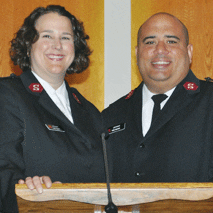 Richard Foster wrote: “If we truly love people, we will desire for them far more than it is within our power to give them, and this will lead us to prayer. Intercession is a way of loving others.” We know instinctively that intercessory prayer is borne out of Christ-inspired love. It is selfless. The one who prays gives of his time and his heart, forgetting himself and lifting his friend to the throne of God. “Bear up the hands that hang down, by faith and prayer; support the tottering knees,” said John Wesley. It is our privilege to do so, and the greatest gift we can give.
Richard Foster wrote: “If we truly love people, we will desire for them far more than it is within our power to give them, and this will lead us to prayer. Intercession is a way of loving others.” We know instinctively that intercessory prayer is borne out of Christ-inspired love. It is selfless. The one who prays gives of his time and his heart, forgetting himself and lifting his friend to the throne of God. “Bear up the hands that hang down, by faith and prayer; support the tottering knees,” said John Wesley. It is our privilege to do so, and the greatest gift we can give.
I have a sister, Jenni, with whom I know I can share any prayer request. Recently I shared a concern with her over the phone, and she suggested we pray. Her prayer was fervent, and I could hear in her voice that she was crying. The situation over which we prayed did not affect her life in the slightest. But she truly interceded for me; for the moment, her heart was full of my hurt, not of herself. True intercessors (whether they are sisters or not) are filled with a compassion that is beyond themselves. It is of Christ.
Years ago, Jenni asked me to pray for two young girls at her corps. These girls were homeless, their mother did not operate as a parent should, and their father was not in the picture. I prayed for them all the time. When Jenni and I spoke on the phone, she would update me on their condition. I felt love well up inside of me for these girls, though for about a year I never even saw their faces. I never knew that in eight years I would be the older sister’s corps officer, and that I would see with my own eyes how God answered the prayers so many people offered on her behalf. We are part of each other’s lives now, and I cherish a strange sort of history with her a history of prayer. Prayer taught me to love her before I ever even knew her.
Perhaps we do not understand prayer for the great act of love that it is. This could be because we perceive prayer as passive. We are people of action! Folding our hands and speaking to God may sometimes seem like inaction. We Christians are prone to say to our friends, “I wish I could help you. All I can do is pray.” Though uttered with the best of intentions, such a comment fails to credit the potency of prayer. A better statement would be, “Friend, I can offer you limitless help, because I can pray.” As there are no bounds to the power of God, petitioning him on behalf of someone else is a very grand thing to do.
Of course, intercessory prayer is a great mystery. For the most part, the praying Christian desires, ultimately, that God’s will be done. Does this imply that God needs our coaxing to fulfill his own will? And how much power can our prayer exercise over man’s free will? If one prays for the salvation of a friend and the friend is saved, can it, to some extent, be credited to the one who prayed? If so, it would certainly follow that if one neglects to pray for a friend’s salvation and the friend is not saved, the neglectful one must shoulder some responsibility. Or, if one faithfully prays and his friend does not receive salvation, did the prayers somehow malfunction?
These questions are beyond my ken. I do know that I prayed for a family member for ten years and finally saw him return to Christ. I also know that I have prayed for a friend for twenty years, and have not seen him even inch toward Christ. I have prayed for healing and seen people healed. I have prayed for healing and seen people die. James 5: 16 says: “The prayer of a righteous man is powerful and effective.” Every Christian can testify to an experience with the potency of prayer, but every Christian must accept the veracity of this verse even when it seems like prayers are bouncing off the walls. An intercessor may never understand exactly how God handles his petitions, or why, but he must rest in the knowledge that “the eyes of the Lord are on the righteous and his ears are attentive to their prayer.” (I Peter 3:12 and Psalm 34: 15)
e-mail Amy Reardon at rareardon@juno.com











